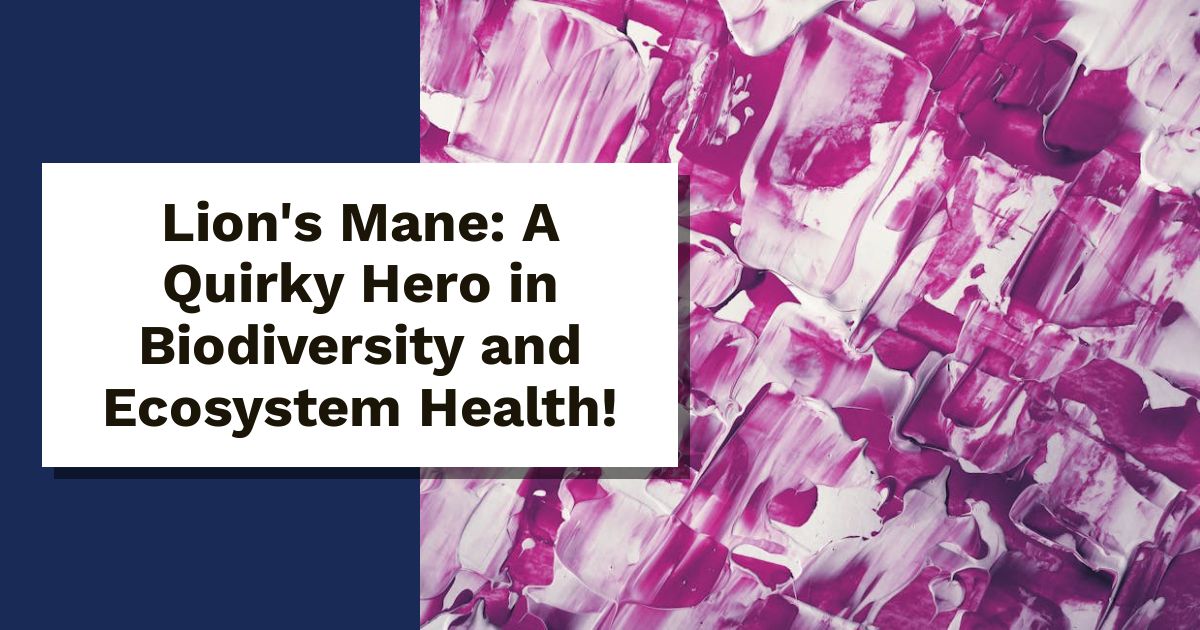Lion’s Mane mushrooms are more than just an interesting addition to your dinner plate; they play a surprising role in promoting biodiversity. These quirky fungi not only boost our immune systems but also support the ecosystem in unique ways.
From creating habitats for various creatures to enhancing soil health, Lion’s Mane contributes to a vibrant environment. With their distinctive appearance and benefits, they’re like nature’s little helpers working behind the scenes.
In this post, we’ll look at how Lion’s Mane supports biodiversity and why it matters to all of us. Get ready for a fun exploration of these fascinating fungi and their significant impact on our world!
What Is Lion’s Mane Mushroom?
Lion’s Mane mushroom, scientifically known as Hericium erinaceus, is not just a culinary delight; it’s a fascinating organism that stands out in nature. Its unique appearance and various health benefits make it a true marvel of the natural world.
Physical Characteristics
Lion’s Mane mushrooms are hard to miss. Their most striking feature is their long, white spines that dangle from a globular body, resembling a lion’s flowing mane—hence the name! These spines can grow up to 1 to 3 inches in length and have a fluffy, textured look. The overall color can range from pure white to a creamy hue, giving it an inviting appearance. This whimsical form not only captivates the eye but also plays a role in its growth and reproduction. Their spongy structure allows them to absorb moisture, making them essential decomposers in their habitat. To learn more about their physical traits, check out this comprehensive guide to Lion’s Mane mushrooms.
Natural Habitat
Lion’s Mane prefers to grow on dead or decaying hardwood trees. You’ll typically find them clinging to species like oak, maple, and beech. They thrive in humid conditions, often emerging during late summer and fall. This mushroom gets its nutrients by decomposing the wood, playing a crucial role in nutrient cycling within the ecosystem. These fungi are primarily saprophytic, which means they feed on organic matter. Curious about their preferred environments? Dive into the details of their natural habitat here.
Culinary Uses
When it comes to the kitchen, Lion’s Mane mushrooms shine remarkably. Their texture is reminiscent of seafood, often compared to crab or lobster. This makes them an excellent choice for various dishes, from soups to stir-fries. A popular way to prepare them is simply to sauté with a little olive oil and seasoning, allowing their natural flavors to stand out. They can also be incorporated into pasta dishes, risottos, and even as a pizza topping. You can explore delicious recipes that feature this unique mushroom, like this 10-minute Lion’s Mane mushroom recipe, or discover five creative ways to cook them in this recipe roundup.
Lion’s Mane and Ecosystem Diversity
Lion’s Mane mushrooms are not just eye-catching; they are key players in maintaining ecosystem diversity. These fungi engage in a variety of interactions that benefit not only themselves but also their surrounding environment. Let’s break down how Lion’s Mane contributes to ecosystem health through symbiotic relationships, attracting wildlife, and enhancing soil health.
Symbiotic Relationships
Lion’s Mane mushrooms form important connections with trees and other plants in their environment. These fungi establish symbiotic relationships, particularly with hardwood trees like oak and maple. Through mycorrhizal associations, Lion’s Mane effectively helps trees absorb water and essential nutrients from the soil, while the trees provide carbohydrates to the fungi.
This mutual exchange is vital for both parties—trees gain support for growth, while Lion’s Mane thrives by receiving energy-rich sugars from photosynthesis. This helps sustain the health of forest ecosystems. Curious about the intricacies of these relationships? You can learn more about mushroom and tree partnerships in this detailed overview.
Attracting Wildlife
Lion’s Mane also plays a crucial role in supporting local wildlife. By creating a habitat rich in nutrients, these mushrooms attract various organisms, from insects to mammals. Animals like squirrels, deer, and various bird species benefit from the mushrooms as a food source.
The presence of Lion’s Mane contributes to a balanced ecosystem by increasing species diversity. When wildlife thrives, it encourages natural predation and pollination, further supporting healthy plant communities. For an engaging look at how Lion’s Mane interacts with local fauna, check this interesting read.
Soil Health Benefits
The impact of Lion’s Mane on soil health cannot be overstated. As a decomposing fungus, it breaks down dead organic matter, returning crucial nutrients to the soil. This process improves soil fertility and encourages the growth of other plants, creating a thriving ecosystem.
The enzymes produced by Lion’s Mane help decompose tough materials, turning them into valuable organic matter. This not only enriches the soil but also enhances its structure, promoting better water retention and aeration. Interested in the benefits of mushroom-influenced soil? Delve into the details in this helpful article.
As we explore the multi-faceted contributions of Lion’s Mane to biodiversity, it is clear that this unique mushroom is more than a culinary delight—it’s a vital component of healthy ecosystems.
Medicinal Benefits of Lion’s Mane
Lion’s Mane mushrooms aren’t just fascinating to look at; they hold a treasure trove of medicinal benefits. From boosting brain health to reducing inflammation, these unique fungi contribute significantly to our well-being and, by extension, to the ecosystems they’re part of.
Cognitive and Memory Support
One of the standout features of Lion’s Mane is its positive impact on cognitive health. This mushroom contains compounds called hericenones and erinacines, which have been shown to stimulate the growth of nerve cells. This stimulation can enhance memory and overall cognitive function. Imagine your brain as a garden; Lion’s Mane acts like a gardener, helping your neurons thrive and flourish.
Research indicates that Lion’s Mane may even provide protective benefits against dementia and other cognitive decline disorders. Studies have suggested that regular consumption could help improve cognitive performance in both healthy individuals and those with mild cognitive impairment. Curious about the science behind this? You can explore more about its brain-boosting potential in this article.
Enhancing brain function doesn’t only improve individual health. By supporting cognitive health in the community, it leads to more engaged and active individuals who can contribute positively to their environments. This ripple effect can play a part in maintaining ecosystem balance by fostering a more knowledgeable and aware society.
Anti-inflammatory Properties
Beyond cognitive benefits, Lion’s Mane mushrooms are known for their anti-inflammatory properties. Inflammation is a natural response, but chronic inflammation can be detrimental—leading to various health issues, including heart disease and autoimmune conditions. Lion’s Mane contains bioactive compounds that help reduce inflammation, acting like a soothing balm for the body.
In laboratory studies, Lion’s Mane has shown promise in minimizing inflammation markers in cells. By quelling inflammation, it can potentially enhance overall health and resilience, enabling organisms in an ecosystem to thrive. This means healthier wildlife and plants, contributing to a vibrant and balanced ecosystem. For a deeper dive into these findings, check out this study.
When you incorporate Lion’s Mane into your routine, you’re not just looking after yourself; you’re promoting a healthier environment. As healthier organisms contribute to nutrient cycling and habitat diversity, the ecosystem benefits overall. Imagine a chain reaction, where reducing inflammation in one organism fosters stability in the ecosystem at large.
The medicinal benefits of Lion’s Mane are both intriguing and impactful. By supporting cognitive health and reducing inflammation, this mushroom is truly a hero in the interconnected web of life.
Conservation Efforts Involving Lion’s Mane
Protecting Lion’s Mane mushrooms is essential not only for their survival but also for the ecosystems they support. Through sustainable harvesting and ongoing research, we can ensure that these fascinating fungi continue to thrive in their natural habitats.
Sustainable Harvesting
Collecting Lion’s Mane mushrooms should be done with care and respect. Sustainable practices help maintain healthy populations and environments. Here’s why sustainable harvesting is important:
- Preservation of Ecosystems: Overharvesting can lead to the decline of Lion’s Mane populations. This affects not only the mushrooms but also the local wildlife and plant communities that rely on them. If we take too much from the forest, we’re disrupting a delicate balance.
- Ethical Foraging: Harvesting mushrooms responsibly means leaving enough behind for nature to regenerate. Aim to take only a portion of what you find—this allows the mushrooms to reproduce and continue their life cycle. Experts recommend leaving at least half of a patch unpicked, ensuring future growth. For more tips on ethical foraging, check out this guide to sustainable mushroom foraging.
- Careful Collection Techniques: Always choose mushrooms that are healthy and intact. Cutting them at ground level is best, and storing them in mesh bags allows for airflow, helping prevent spoilage. For detailed methods on safe and sustainable mushroom harvesting, visit this article on safe, sustainable mushroom harvesting.
Research and Preservation
Current research efforts aim to study and protect Lion’s Mane populations, ensuring their survival in a changing world.
- Understanding Their Ecology: Scientists are exploring how Lion’s Mane interacts with its environment. This includes its role in nutrient cycling and relationships with other forest organisms. Such studies can help us understand the significance of Lion’s Mane in biodiversity. For more insights, this research article explores various bioactive compounds found in mushrooms like Lion’s Mane.
- Conservation Initiatives: Various organizations are working to conserve natural habitats where Lion’s Mane thrives. They focus on preserving forests, promoting sustainable harvesting practices, and raising awareness about the ecological role of mushrooms.
- Public Awareness and Education: By increasing public knowledge about Lion’s Mane, researchers aim to inspire support for conservation efforts. Educational resources help underscore why protecting these fungi benefits entire ecosystems. For an overview of their potential health benefits, delve into this research paper.
The conservation of Lion’s Mane mushrooms is not just about saving a unique species; it’s about preserving the vibrant ecosystems they enrich. Through sustainable harvesting and dedicated research, we can maintain the delicate balance of nature in which these mushrooms play a crucial role.
How You Can Help
Everyone can play a part in supporting Lion’s Mane and promoting biodiversity. Whether you’re an outdoor enthusiast, a foodie, or simply someone who loves nature, there are ways you can contribute positively. Let’s explore how you can make a difference.
Foraging Tips
Foraging for Lion’s Mane mushrooms can be an exciting adventure. However, safety and sustainability are key. Here are some tips to follow:
- Know Your Fungi: Ensure you can accurately identify Lion’s Mane before picking. Its unique appearance resembles a lion’s mane with long, white spines hanging from a bulbous body.
- Choose the Right Time: The best time to forage is during late summer to early fall when Lion’s Mane is in full bloom.
- Use the Right Tools: Bring along a sharp knife to cut the mushroom at its base. It’s best to get as close to the wood as possible to avoid damaging the mycelium.
- Leave Some Behind: Take only a portion of what you find—leaving some allows the fungus to regrow. This practice supports long-term sustainability.
- Check Local Regulations: Be informed about foraging laws in your area. Some places may have restrictions on mushroom picking.
For more detailed guidance on foraging safely, check out this ultimate guide to foraging Lion’s Mane.
Supporting Local Farmers
Buying from local growers ensures fresh mushrooms and supports the community. You can help in several ways:
- Shop at Farmers’ Markets: Look for stalls that offer Lion’s Mane mushrooms. This not only guarantees quality but helps local agriculture thrive.
- Connect with Local Farmers: Establish relationships with mushroom growers. Understanding their methods and challenges can deepen your appreciation for what goes into producing these unique fungi.
- Participate in Community Efforts: Get involved in local farming initiatives. Whether it’s helping with harvests or community education, every bit helps promote fungus cultivation.
- Consider Growing Your Own: If you have space, consider starting your own small mushroom farm. Kits are widely available and can provide a fun DIY project.
To learn more about supporting local farmers and where to buy Lion’s Mane, visit this guide on selling Lion’s Mane mushroom products.
Engaging with the community and being mindful of nature can truly amplify the positive impact Lion’s Mane has on our ecosystems.
Conclusion
Lion’s Mane mushrooms play a key role in promoting biodiversity. Their unique contributions support local ecosystems and enhance soil health.
By forming beneficial relationships with trees, attracting wildlife, and breaking down organic matter, they help create balanced habitats.
Next time you spot this quirky fungus, consider the bigger picture of its impact on the world around you. Let’s appreciate these charming little helpers and take steps to protect them. How will you contribute to the preservation of biodiversity in your area?
Dr. Cordy is a passionate advocate for the incredible benefits of Lion's Mane mushrooms, blending scientific insight with a deep enthusiasm for natural wellness. When he’s not exploring the latest research on functional fungi, you’ll find him chasing waves as an avid surfer, strategizing over chess matches, or embarking on outdoor adventures that fuel his curiosity and love for nature. A devoted dog dad and lifelong explorer, Dr. Cordy combines his diverse passions with a mission to educate and inspire others about the transformative potential of Lion’s Mane mushrooms. You can unearth his latest Lion's Mane insights here. 🍄


